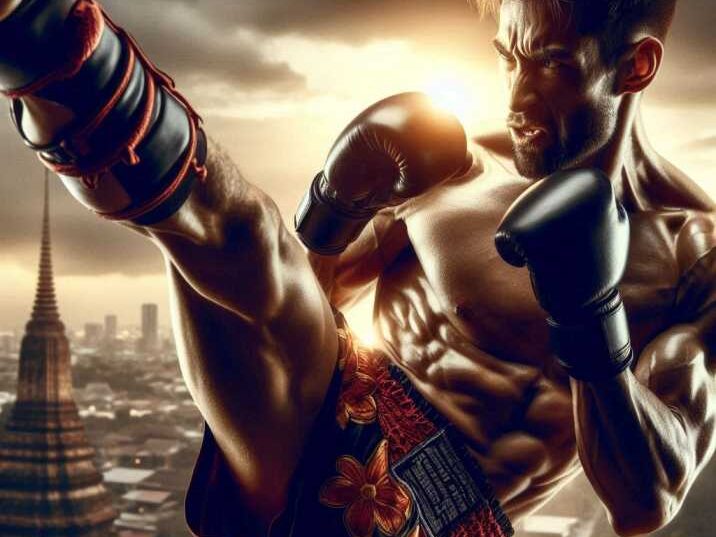Introduction
Table of Contents
Muay Thai, often referred to as the “Art of Eight Limbs,” is a martial art from Thailand that has gained immense popularity worldwide. With its combination of punches, kicks, elbows, and knee strikes, Muay Thai is both a competitive sport and a self-defense practice. Given its global recognition, many wonder, is Muay Thai an Olympic sport? In this article, we will explore the history of Muay Thai, its journey to becoming an Olympic sport, and where it stands today.

What is Muay Thai?
Muay Thai is a traditional martial art that originated in Thailand centuries ago. It is known for its powerful strikes, clinching techniques, and the use of eight contact points—punches, kicks, elbows, and knees. Muay Thai has evolved into a popular sport with professional leagues and international competitions, attracting athletes and enthusiasts from around the world.
The Origins of Muay Thai
Muay Thai has its roots in ancient Thai military training, where soldiers learned hand-to-hand combat techniques. Over time, it transformed into a sport, with matches held in local communities. By the 20th century, Muay Thai had become a national sport in Thailand, and its popularity began to spread globally.
Is Muay Thai an Olympic Sport?
Muay Thai, despite its global popularity and long history, has not yet become an Olympic sport. However, progress is being made. The recognition by the International Olympic Committee (IOC) marks a significant milestone, bringing Muay Thai closer to potential Olympic inclusion.
Muay Thai’s Recognition by the IOC
In 2016, the IOC granted provisional recognition to Muay Thai through the International Federation of Muaythai Associations (IFMA). This recognition is critical because it officially acknowledges Muay Thai as a sport with international significance. It also paves the way for the sport to be considered for future Olympic Games, increasing its visibility and credibility on the global stage.
What Does Recognition Mean?
Provisional recognition from the IOC means that Muay Thai meets Olympic standards and is recognized as a legitimate, globally practiced sport. It signifies that the sport is under evaluation and, if it continues to demonstrate adherence to these standards—such as fair play, gender equality, and athlete welfare—it may eventually be included in the Olympic Games. This recognition is a key step in the sport’s journey toward full Olympic status.
Challenges and Progress Toward Olympic Inclusion
While Muay Thai’s recognition by the IOC is a significant milestone, there are still challenges to overcome before it can become an Olympic sport. These challenges include meeting the Olympic Charter’s requirements, standardizing rules, and gaining approval from the IOC.
Standardizing Rules and Regulations
One of the primary challenges is standardizing Muay Thai’s rules and regulations across different countries. The IFMA has been working to ensure that Muay Thai competitions follow a uniform set of rules, which is essential for Olympic inclusion.
Promoting Gender Equality
Another key aspect of Muay Thai’s Olympic journey is promoting gender equality. The sport has made significant strides in recent years, with more women participating in competitions. The IOC values gender equality in sports, so Muay Thai’s efforts in this area are crucial.
The Future of Muay Thai in the Olympics
The future looks promising for Muay Thai as it continues to gain recognition and popularity. Although it is not yet an Olympic sport, there is hope that Muay Thai will be included in future Olympic Games.

Muay Thai in Other Major Sports Events
Even though Muay Thai is not an Olympic sport, it is featured in other major sports events, such as the World Games and the Asian Games. These events help increase the sport’s visibility and push it closer to Olympic inclusion.
What Would Olympic Inclusion Mean for Muay Thai?
If Muay Thai becomes an Olympic sport, it would significantly boost its global profile. More athletes would have the opportunity to compete on the world stage, and the sport would likely gain even more fans and participants worldwide.
Why Muay Thai Deserves a Place in the Olympics
Muay Thai’s rich cultural history, global popularity, and athletic appeal make it a strong candidate for Olympic inclusion. The sport embodies many of the values that the Olympics promote, including discipline, respect, and excellence.
Cultural Significance
Muay Thai is more than just a sport; it is a cultural heritage of Thailand. Including Muay Thai in the Olympics would recognize its historical and cultural significance on a global stage.
Athleticism and Skill
Muay Thai requires a high level of athleticism, technique, and strategy. Its inclusion in the Olympics would showcase the skills of Muay Thai athletes and highlight the sport’s unique challenges.
Muay Thai vs. Other Combat Sports in the Olympics
Comparing Muay Thai to other combat sports like boxing, judo, and taekwondo reveals why it would be a valuable addition to the Olympic Games.
Muay Thai vs. Boxing
Both Muay Thai and boxing are striking-based sports, but Muay Thai is more versatile because it utilizes eight points of contact—punches, kicks, elbows, and knees—compared to boxing’s reliance solely on punches. This additional range of techniques makes Muay Thai more complex and dynamic, offering a broader skill set that could provide a fresh challenge in the Olympic combat sports arena.
Muay Thai vs. Judo and Taekwondo
Judo and taekwondo are established Olympic sports, each focusing on specific techniques—judo with grappling and throws, and taekwondo with fast, high kicks. While these sports highlight the diversity of martial arts, Muay Thai’s combination of striking and clinching adds a unique style that would further enrich the Olympic lineup. Its inclusion would showcase the effectiveness of a multifaceted martial art, appealing to a wider audience and enhancing the variety of combat sports at the Games.
Table of Information: Key Points about Muay Thai and the Olympics
| Topic | Details |
|---|---|
| Muay Thai’s Origin | Ancient Thai martial art known as the “Art of Eight Limbs.” |
| IOC Recognition | Provisional recognition granted in 2016 through the IFMA. |
| Challenges for Olympic Inclusion | Standardizing rules, promoting gender equality, and meeting Olympic Charter requirements. |
| Current Major Events | Featured in the World Games and Asian Games. |
| Potential Impact of Olympic Inclusion | Increased global visibility, more athletes participating, and recognition of Muay Thai’s cultural significance. |
Conclusion
Muay Thai, the “Art of Eight Limbs,” has captured the hearts of martial arts enthusiasts worldwide with its rich history and powerful techniques. While it is not yet an Olympic sport, the recognition by the International Olympic Committee (IOC) marks a significant step toward that goal. The journey to Olympic inclusion involves overcoming challenges like standardizing rules and promoting gender equality, but the future looks promising.
As Muay Thai continues to grow in popularity and gain recognition in major sports events, there is hope that one day it will earn a place in the Olympic Games. For now, Muay Thai remains a celebrated martial art and sport, valued for its cultural significance and athleticism, with the potential to shine even brighter on the global stage.
FAQs
- Is Muay Thai an Olympic sport?
No, Muay Thai is not yet an Olympic sport, but it has been provisionally recognized by the IOC. - What is the main challenge for Muay Thai’s Olympic inclusion?
The main challenge is standardizing rules and regulations across different countries. - Has Muay Thai been included in any major sports events?
Yes, Muay Thai is featured in the World Games and Asian Games. - Why is Muay Thai called the “Art of Eight Limbs”?
Muay Thai uses eight contact points: punches, kicks, elbows, and knees. - What would Olympic inclusion mean for Muay Thai?
It would increase the sport’s global visibility and allow more athletes to compete internationally.


